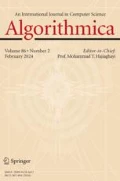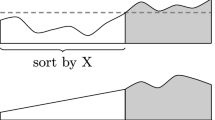Abstract
In this paper we investigate the top-k-selection problem, i.e. to determine and sort the top k elements, in the dynamic data model. Here dynamic means that the underlying total order evolves over time, and that the order can only be probed by pair-wise comparisons. It is assumed that at each time step, only one pair of elements can be compared. This assumption of restricted access is reasonable in the dynamic model, especially for massive data sets where it is impossible to access all the data before the next change occurs. Previously only two special cases were studied (Anagnostopoulos et al. in 36th international colloquium on automata, languages and programming (ICALP). LNCS, vol 5566, pp 339–350, 2009) in this model: selecting the element of a given rank, and sorting all elements. This paper systematically deals with \(1\le k\le n\). Specifically, we identify the critical point \(k^*\) such that the top-k-selection problem can be solved error-free with probability \(1-o(1)\) if and only if \(k=o(k^*)\). A lower bound of the error when \(k=\varOmega (k^*)\) is also determined, which actually is tight under some conditions. In contrast, we show that the top-k-set problem, which means finding the top k elements without sorting them, can be solved error-free with probability \(1-o(1)\) for all \(1\le k\le n\). Additionally, we consider some extensions of the dynamic data model and show that most of these results still hold.


Similar content being viewed by others
References
Anagnostopoulos, A., Kumar, R., Mahdian, M., Upfal, E.: Sort me if you can: how to sort dynamic data. In: 36th International Colloquium on Automata, Languages and Programming (ICALP). LNCS, vol. 5566, pp. 339–350 (2009)
Ilyas, I., Beskales, G., Soliman, M.: A survey of top-\(k\) query processing techniques in relational database systems. ACM Comput. Surv. 40(4), 11 (2008)
Whang, K., Kim, M., Lee, J.: Linear-time top-k sort method. US Patent 8,296,306 B1 (2012)
Knuth, D.E.: The Art of Computer Programming, vol. 3. Addison-Wesley, Reading (1973)
Kislitsyn, S.S.: On the selection of the \(k\) th element of an ordered set by pairwise comparison. Sibirskii Mat. Zhurnal 5, 557–564 (1964)
Blum, M., Floyd, R., Pratt, V., Rivest, R., Tarjan, R.: Time bounds for selection. J. Comput. Syst. Sci. 7(4), 448–461 (1973)
Dor, D., Zwick, U.: Selecting the median. In: SODA 1995, pp. 28–37 (1995)
Moreland, A.: Dynamic Data: Model, Sorting, Selection. Technical report (2014)
Anagnostopoulos, A., Kumar, R., Mahdian, M., Upfal, E., Vandin, F.: Algorithms on evolving graphs. In: 3rd Innovations in Theoretical Computer Science Conference (ITCS), pp. 149–160. ACM, New York (2012)
Bahmani, B., Kumar, R., Mahdian, M., Upfal, E.: Pagerank on an evolving graph. In: 18th ACM International Conference on Knowledge Discovery and Data Mining (SIGKDD), pp. 24–32. ACM (2012)
Zhuang, H., Sun, Y., Tang, J., Zhang J., Sun, X.: Influence maximization in dynamic social networks. In: 13th IEEE International Conference on Data Mining (ICDM), pp. 1313–1318. IEEE (2013)
Kanade, V., Leonardos, N., Magniez, F.: Stable matching with evolving preferences (2015). arXiv:1509.01988
Labouseur, A.G., Olsen, P.W., Hwang, J.H.: Scalable and robust management of dynamic graph data. In: 1st International Workshop on Big Dynamic Distributed Data (BD3@VLDB), pp. 43–48 (2013)
Ren, C.: Algorithms for evolving graph analysis. Doctoral dissertation, The University of Hong Kong (2014)
Ajtai, M., Feldman, V., Hassidim, A., Nelson, J.: Sorting and selection with imprecise comparisons. In: 36th International Colloquium on Automata, Languages and Programming (ICALP). LNCS, vol. 5566, pp. 37–48 (2009)
Feige, U., Raghavan, P., Peleg, D., Upfal, E.: Computing with noisy information. SIAM J. Comput. 23(5), 1001–1018 (1994)
Finocchi, I., Grandoni, F., Italiano, G.: Optimal resilient sorting and searching in the presence of memory faults. In: 33th International Colloquium on Automata, Languages and Programming (ICALP). LNCS, vol. 4051, pp. 286–298 (2006)
Finocchi, I., Italiano, G.: Sorting and searching in the presence of memory faults (without redundancy). In: 36th Annual ACM Symposium on Theory of Computing (STOC), pp. 101–110 (2004)
Erlebach, T., Hoffmann, M., Kammer, F.: On temporal graph exploration. In: 42th International Colloquium on Automata, Languages and Programming (ICALP). LNCS, vol. 9134, pp. 444–455 (2015)
Babcock, B., Babu, S., Datar, M., Motwani, R., Widom, J.: Models and issues in data stream systems. In: 21st ACM SIGMOD-SIGACT-SIGART symposium on Principles of Database Systems (PODS), pp. 1–16. ACM (2002)
Bressan, M., Peserico, E., Pretto, L.: Approximating PageRank locally with sublinear query complexity (2014). arXiv:1404.1864
Fujiwara, Y., Nakatsuji, M., Shiokawa, H., Mishima, T., Onizuka, M.: Fast and exact top-k algorithm for PageRank. In: 27th AAAI Conference on Artificial Intelligence, pp. 1106–1112 (2013)
Albers, S.: Online algorithms: a survey. Math. Programm. 97(1–2), 3–26 (2003)
Kuleshov, V., Precup, D.: Algorithms for multi-armed bandit problems (2014). arXiv:1402.6028
Dubhashi, D.P., Panconesi, A.: Concentration of Measure for the Analysis of Randomized Algorithms. Cambridge University Press, Cambridge (2009)
Acknowledgements
The work is partially supported by the National Key Research and Development Program of China (2016YFB1000201, 2016YFB1000604), State Key Laboratory of Software Development Environment Open Fund (SKLSDE-2016KF-01), Science Foundation of Shenzhen City in China (JCYJ20160419152942010), National Natural Science Foundation of China (61222202, 61433014, 61502449, 61602440), and the China National Program for support of Top-notch Young Professionals.
Author information
Authors and Affiliations
Corresponding author
Rights and permissions
About this article
Cite this article
Huang, Q., Liu, X., Sun, X. et al. Partial Sorting Problem on Evolving Data. Algorithmica 79, 960–983 (2017). https://doi.org/10.1007/s00453-017-0295-3
Received:
Accepted:
Published:
Issue Date:
DOI: https://doi.org/10.1007/s00453-017-0295-3




